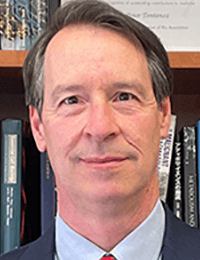The 2002 ASCI Award: Ronald A. DePinho, MD
Ronald A. DePinho, MD, received the 2002 ASCI Award, given on the basis of his fundamental discoveries spanning the fields of cancer research, aging, and chronic degenerative disease. He is a leader in utilizing the experimental power of the mouse to understand the molecular underpinnings of complex human disorders. His contributions have shaped basic understanding of how aspiring cancer cells achieve their lethal endpoint and include the recognition that p53 functions as a tumor suppressor by activating apoptosis in the face of aberrant cell cycling, that INK4a/ARF is a true tumor suppressor, and that ARF is genetically and biochemically linked to the p53 pathway. His studies of p16INK4a revealed its function as a guardian against environmental carcinogens — an observation with implications in cancer prevention.
He has championed the use of inducible cancer models for the study of host-tumor interactions and the validation of cancer targets. Notably, through this system, he demonstrated the concept of tumor maintenance. His studies of the Myc oncoprotein demonstrated a dominant negative approach in mammalian cells, uncovered a tumor suppressor role for the Myc antagonist Mxi1, and led to the co-discovery of the mammalian Sin3 complex and its link to chromatin regulation. His work on telomerase has shed light on why age is a potent carcinogen, why chronic high-turnover diseases may progress to cancer, and why epithelial cancers emerge with radically altered genomes. He has championed telomere-based crisis as a major mechanism driving chromosomal aberrations characteristic of most human carcinomas. His program also established important pathogenetic links between telomere dysfunction and age-related disorders and chronic degenerative diseases, such as liver cirrhosis.
Dr. DePinho is also dedicated to the development of young physician-scientists and to community initiatives, which have included the organization of numerous courses and meetings focused on mouse genome manipulation and biology.
Dr. DePinho studied Art History and Biology at Fordham University. He received his M.D. degree with distinction in Microbiology and Immunology from the Albert Einstein College of Medicine.


